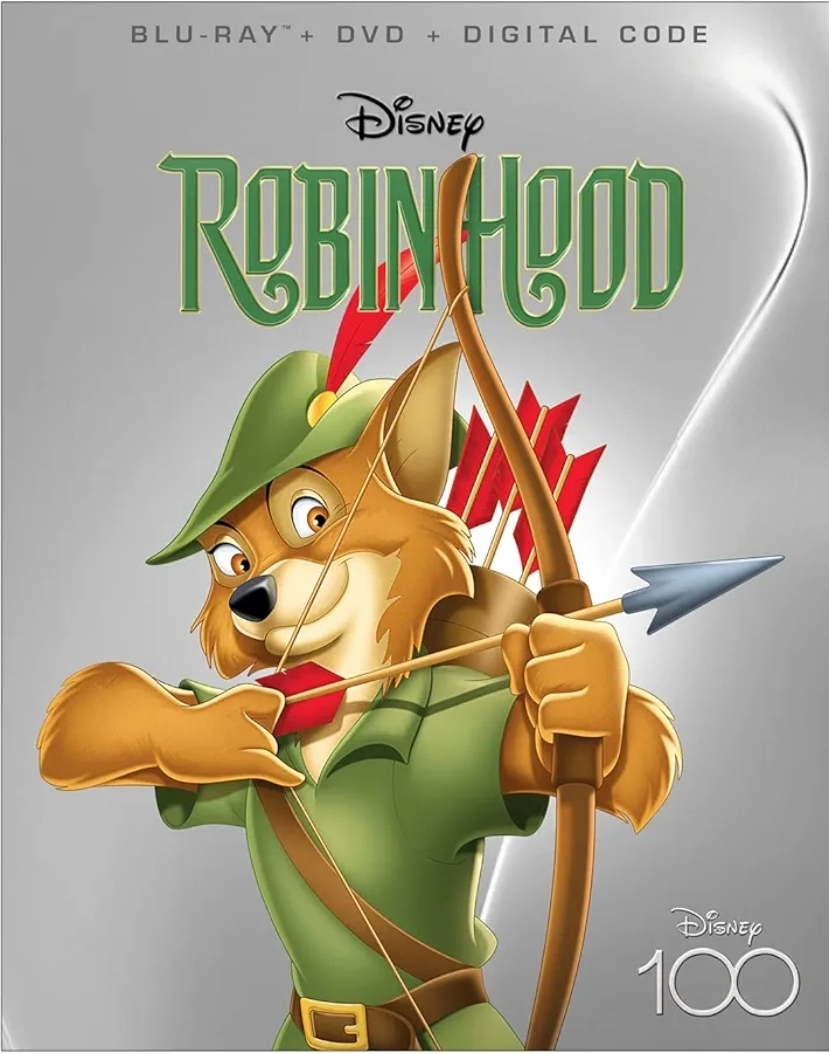Setting: Medieval Nottingham reimagined with anthropomorphic animals
Core Question: When law is bent to enrich the powerful, what makes resistance just—clever theft, principled disobedience, or Agápē ordered to the poor?
Tagline (spirit): “Legality without justice is plunder; courage ordered by Agápē becomes mercy with a bow.”*
When we left The Lion King, the lesson was stark: kingdoms don’t collapse first at the borders but in the conscience of their rulers. Scar seized the throne, but not responsibility; the land withered because “kingship without conscience is tyranny.” Look around—doesn’t Pride Rock under hyena management feel uncomfortably familiar? Drained institutions, scavenger politics, and a people told to accept scarcity as destiny. This is Tytler’s Cycle in living color: abundance squandered, apathy indulged, dependency engineered—bondage sold back to us as “normal.”
If Lion King was the diagnosis, Robin Hood is the autopsy on our laws. Bastiat warned that when legislation is bent to siphon the labor of the many for the luxury of the few, it keeps its robe but loses its soul—legal plunder. Nottingham is what happens when palaces call extraction “policy” and poverty “price.” The crown still gleams, the decrees still bear seals, but widows lose their bread and fathers lose their homes. Forms remain; justice flees.
So what restores a broken realm: more edicts, cleverer courtiers, a flashier parade? Robin Hood answers with a harder path—responsibility embraced and love rightly ordered. Not vengeance with a quiver, but mercy with a bow: risking self to restore neighbors, shielding families from predation, bending the law back toward the common good. Courage, yes—but courage governed by Agápē, or it curdles into another tyrant in green.
This is where our national memory matters. We remember God—not as a slogan, but as the Giver of moral law that limits rulers and lifts the lowly. We remember family—the first school of freedom where promises are kept and persons come before programs. And we remember our charter—the founding mission that wed liberty to virtue, rights to responsibilities, consent to the common good. Scar’s kingdom is what we get when those vows are forgotten; Sherwood is what happens when they’re kept in the teeth of power.
Robin Hood isn’t asking us to romanticize theft; it’s asking us to recognize theft when it wears a signet ring. It isn’t a call to rage; it’s a call to re-covenant—to resist legal plunder, rebuild local loyalties, and reorder power under Agápē. Only then does a ravaged realm move from scarcity back to song—and a nation remember who it is.
Taxes, Fear, and a Fox Who Won’t Play the Game
Moral Core: Legality vs. justice
Prince John and the Sheriff of Nottingham weaponize taxes to wring out the vulnerable. Robin Hood and Little John live outside the law but inside a moral code: steal only from the oppressor, shelter the poor, never harm the innocent.
Lessons
- Law can be captured; legality is not identical to justice.
- Conscience may demand civil disobedience when institutions fail.
- Charity is necessary, but solidarity (changing the flow of resources) is better.
Philosophical Frame
- Natural law: Unjust “laws” lack moral authority.
- Thomistic/Lockean strands: Political power exists to protect the common good, not extract it.
Masks, Pageantry, and the Economics of Spectacle
Moral Core: Truth vs. performance
At the archery tournament, power stages a spectacle to bait Robin; Robin stages a counter-spectacle to unmask greed. Maid Marian remembers love as covenant, not commodity; Friar Tuck tends the wounded spirit of a plundered town.
Lessons
- Tyrannies need theater; satire and courage puncture the script.
- Love that remembers (Marian) anchors vocation beyond adrenaline.
- Communities need both bread and rituals of hope.
Philosophical Frame
- Arendt: Regimes manufacture consent with pageantry; truth cracks the façade.
- Augustine’s ordo amoris: Rightly ordered love steadies action amidst chaos.
The Poor Box Emptied: When Mercy Meets the Gallows
Moral Core: The cost of conscience
The Sheriff seizes church alms; Tuck resists and is sentenced to hang—punishment as intimidation. Robin chooses risk over safety to save one just man; Little John’s loyalty converts outrage into coordinated action.
Lessons
- Mercy without courage is sentimental; courage without mercy is violent.
- A single unjust punishment often clarifies the moral stakes for all.
- True friendship weaponizes neither guilt nor fear; it organizes care under risk.
Philosophical Frame
- Kant: Persons must never be used as examples to terrify a populace.
- Personalism: The inviolable worth of the person limits the state.
The Night Raid: Theft, Restitution, and the Ethics of Taking
Moral Core: Restoring what robbery of the poor has stolen
The jailbreak heist returns confiscated coins to townsfolk; Robin steals back what unjust tax took. Sir Hiss’s manipulations expose the regime’s paranoia; Prince John’s hoarding becomes his downfall.
Lessons
- Resistance aims not at humiliation but at restoration.
- Strategic cunning is ethical when ordered to the common good and constrained by non-maleficence.
- Hoarded wealth corrodes judgment and security alike.
Philosophical Frame
- Restorative justice: Repair victims first; transform structures that create harm.
- Virtue ethics: Prudence guides daring so it serves Agápē, not ego.
Fall of the Usurper: Mercy, Covenant, and the Return of Legitimate Rule
Moral Core: Justice reunited with authority
The coup of greed collapses; King Richard returns, restoring accountable order. Marian and Robin’s union signals a politics grounded in covenant, not extraction; Nottingham re-learns celebration without fear.
Lessons
- Authority is validated by whom it protects, not whom it enriches.
- Mercy completes justice: the cycle ends not with vengeance but with right order restored.
- Love (Marian–Robin, town–king) is political glue when translated into institutions.
Philosophical Frame
- Eudaimonia: Flourishing community requires just rulers and virtuous citizens.
- Civic friendship: Social peace is built on mutual obligation, not terror.
Symbols & What They Mean
| Symbol | Meaning |
|---|---|
| Bow & arrow | Power directed by conscience; precision over brute force |
| Sheriff’s tax bag / scales | Legalized plunder; justice skewed by capture |
| Poor box (church alms) | Sacred trust; society’s duty to its weakest |
| Disguises & pageantry | Theater of power vs. counter-theater of truth |
| Archery tourney | Spectacle as trap; courage as public witness |
| Gallows | Intimidation state; punishment as propaganda |
| Royal seal / rings | Legitimacy vs. vanity; sign of covenant misused |
Core Themes (with Real-World Applications)
Justice > Legality
Lesson: Not all that is legal is just.
Apply: Build “red-flag” reviews for policies with regressive effects (fees, fines, seizures).
Civil Disobedience with Guardrails
Lesson: Resistance must heal, not merely harm.
Apply: Define non-negotiables: protect noncombatants, restore the taken, document accountability.
Economies of Mercy
Lesson: Charity relieves; justice reorders flows.
Apply: Pair aid with policy fixes (fee amnesty, debt relief, fair-tax design).
Courage in Community
Lesson: Lone heroes burn out; teams sustain virtue.
Apply: Organize roles—scout, shield, storyteller, steward—to distribute risk and credit.
Agápē as Aim
Lesson: The point is people, not victory laps.
Apply: Measure wins by the least-advantaged stakeholder’s outcome, not headlines.
Character Arcs (as Moral Progress)
| Character | Starting Constraint | Transforming Moment | New Virtue |
|---|---|---|---|
| Robin Hood | Merry outlaw thrill | Risks self to save Tuck; returns wealth, not just pride | Courage ordered by Agápē, restorative justice |
| Little John | Bravado sidekick | Turns anger into disciplined rescue | Loyal prudence, solidarity |
| Maid Marian | Private nostalgia | Publicly affirms Robin’s vocation; channels it toward covenant | Hope, steadfast love |
| Friar Tuck | Gentle charity | Defies confiscation; faces gallows | Prophetic courage |
| Sheriff of Nottingham | Legalist extractor | Exposed by public restitution | (Negative) Tool of tyranny |
| Prince John | Vanity, greed, fear | Hoarding → paranoia → collapse | (Negative) Hubris punished |
| Sir Hiss | Manipulative counsel | Unmasks regime’s insecurity | (Negative) Cunning without conscience |
Moral Psychology (Kohlberg Mapping)
- Stage 2 (Self-Interest): Prince John’s hoarding; Sheriff’s bounty mentality.
- Stage 3 (Approval): Pageantry, titles, public flattery.
- Stage 4 (Law/Order): “Just doing my job” tax seizures.
- Stage 5 (Social Contract): Robbing the rich because the social contract is broken.
- Stage 6 (Principle): Risking life to free the innocent; restoring the robbed regardless of personal gain.
A Practical “Robin Hood” Checklist (for People, Orgs, Communities)
- Justice Audit: Identify policies that extract from the vulnerable; replace with tiered or restorative models.
- Restoration First: When harm is found, return what was taken—before PR.
- Conscience Protocol: Empower protected dissenters (your “Friar Tucks”) with veto power over unjust actions.
- Spectacle Discipline: Don’t perform virtue; build systems. Celebrate only after restitution and reform.
- Team Courage: Train “merry band” roles so risk is shared and the goal stays people, not headlines.
Final Reflection
Disney’s Robin Hood wraps a child-bright fable around an adult moral spine: justice cannot be reduced to receipts and seals. When power dress-rehearses theft as law, a fox with a conscience becomes a physician of the body politic—suturing mercy to courage, and cunning to Agápē. The point is not humiliating princes; it is freeing neighbors. And when love becomes public policy, arrows fly truer, gallows stand empty, and Nottingham remembers how to sing.
*What is Agápē?
In classical Greek, there are four common words for “love”:
- Agápē — sacrificial, unconditional love; wills the good of the other, even at personal cost.
- Érōs — romantic/erotic desire; attraction and longing.
- Philia — friendship/affection; comradeship shaped by shared virtue.
- Storgē — familial love; natural affection within family bonds.
Why Agápē fits Disney’s Robin Hood
- Risking self for the poor
Robin Hood repeatedly endangers his life to return confiscated taxes and shield the vulnerable from Prince John and the Sheriff. That’s agápē: choosing others’ welfare over personal safety or gain. - Mercy over humiliation
The goal isn’t to embarrass the tyrant but to restore what was taken and keep families fed. Agápē aims at restitution, not revenge. - Maid Marian’s steadfast love
Marian honors Robin’s calling and the people’s plight, not just the thrill of romance (érōs). Her love strengthens his vocation—agápē that wants the beloved to serve the common good. - Friar Tuck’s courageous charity
When church alms are seized, Tuck resists—even at the gallows. His pastoral care becomes prophetic agápē: protecting the weak by confronting legalized theft. - Philia that carries risk
Little John and the Merry Men aren’t thrill-seekers; they’re loyal friends who share danger, food, and blame. Philia steeped in agápē turns camaraderie into a shield for the town. - Storgē widened to a village
The children of Nottingham (Skippy & Co.) are treated as family, not props. Agápē expands storgē beyond bloodlines so a whole community is held as kin. - Counterfeits unmasked
Prince John calls greed “law” and fear “order.” Agápē exposes this—persons are ends, not revenue streams—and refuses to use people even when it’d be convenient. - Rightful rule as service
The happy return of King Richard signals that legitimate authority protects the least. In biblical terms, kingship is pastoral, not predatory—agápē translated into institutions.
Symbols that point to Agápē in Robin Hood
- Poor box / alms → society’s duty to its weakest; sacred trust.
- Sheriff’s money bags → legalized plunder vs. restorative love.
- Disguises & archery tourney → truth vs. spectacle; courage under risk.
- Gallows → intimidation state confronted by sacrificial love.
- Ring/seal of royalty → authority meant to guard, not gouge.
Quick takeaway
Disney’s Robin Hood teaches that love worthy of a crown is agápē—the courageous, restorative care that returns what fear has taken, protects the small, and turns outlaws into guardians until justice wears the throne again.






